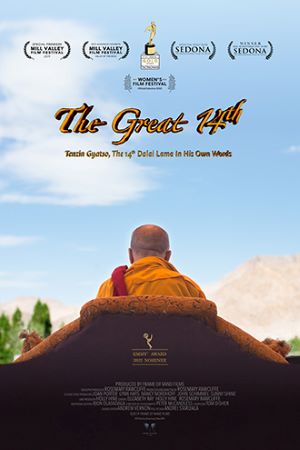
The Great 14th: Tenzin Gyatso, the 14th Dalai Lama in His Own Words 2023
Distributed by Green Planet Films, PO Box 247, Corte Madera, CA 94976-0247; 415-377-5471
Produced by Rosemary Rawcliffe
Directed by Rosemary Rawcliffe
Streaming, 82 mins
High School - General Adult
Buddhism; History
Date Entered: 02/02/2024
Reviewed by Alexander Rolfe, Technical Services Librarian, George Fox University, Newberg, ORThe current Dalai Lama began ruling Tibet in 1950, at 15 years of age, and has become one of the most admired figures in the world. This documentary moves chronologically through his life, as he reflects on events and explains his actions and priorities.
Many are fascinated by the institution itself, how it came to be, and how a child gets chosen to be the new Dalai Lama, but that's not covered here. We see footage of him as a child, and he describes his education and training. He explains his early political ideals, culminating in shedding all political power in 2011; after 400 years as head of state, the Dalai Lama once again became a purely spiritual leader. In spite of the depredations of China and his own flight into exile, he has some kind words for Chairman Mao and communism generally. He expresses relief that he is now in India, where he doesn't have to lie anymore, but views Chinese control of Tibet with equanimity as long as they respect the Tibetan cultural heritage and allow them considerable autonomy. At times he sounds secular, describing religion(s) as a means to an end, and interchangeable, and at other times he speaks of his prophetic dreams and the importance of Avalokiteśvara's statue. His focus on education, compassion, a healthy mind (which doesn't rely on drugs), and altruism comes through clearly, as does his propensity to laugh and enjoy the company of everyone.
The Dalai Lama does all the talking; there is no narration, apart from a few silent messages on the screen to give some necessary historical information. The historical footage from all decades of his long life really enriches the film. The Dalai Lama's English can be hard to understand, so the subtitles were very helpful. The film is divided into thematic chapters, making it easy to show whichever section is relevant to one's class. This would be a valuable addition to collections supporting the study of Buddhism, Tibet, or 20th-century international affairs.
Awards:Best Documentary Feature, Sedona Film Festival
Published and licensed under the Creative Commons Attribution 4.0 license. Anyone can use these reviews, so long as they comply with the terms of the license.